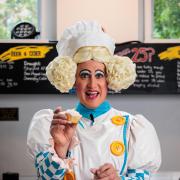He’s moved from military fatigues to Westminster with what appears a seamless ease. But MP Johnny Mercer is still battling every day, as he tells Alexis Bowater

Few people who heard the new MP for Plymouth Moor View’s maiden speech in the House of Commons could fail to be moved by the passion of this ex-serviceman. Some, both in the House and beyond, were indeed moved to tears.
It was an acclaimed debut and one which he is destined to repeat; if his determination and commitment to causes he was voted on, continues in the same vein.
For this is a man on a mission with plenty of experience; having fought in the desert fields of Afghanistan, lost his men there, and even more tragically and significantly, lost more in the fields of his homeland after they returned from war.
This dreadful travesty is the driving force behind his twin campaigns to make Plymouth the UK centre of excellence for veterans’ care and to create a 24-hour city centre drop-in centre for those living with mental health problems.

He wasn’t expected to win Plymouth Moor View - early polls had him behind the Labour Party incumbent and UKIP - but hey, in 2015 what did the polls know?
Aged just 34, he now has a nearly a year’s experience walking the corridors of Westminster and already a pretty strong track record of getting things done. This month, a massive awareness-raising campaign is due to kick off to help the veterans he vowed to help in Plymouth.
“It’s been a remarkable year,” he reflects. “It’s been really good. It’s not what you expect, it is extraordinarily busy, it is extraordinarily public, but it is also an extraordinary privilege and an opportunity to do the things that I really care about whether it is for Plymouth, mental health, veterans or young people. It has given me a platform that I am very lucky to have.”
These four subjects are at the heart of all his campaigning to make permanent and structured positive change, particularly for the most disadvantaged of the city.
“Anyone who has ever had anything to do with Plymouth uses the word ‘potential’. We have this amazing city - you don’t get a natural harbour like that this side of San Francisco - but for some reason our health spending, our arts spending, our transport spending has not been good enough over the years.
“We have some serious challenges around deprivation, about poverty, about life chances for our families.
“I am determined to win that battle, to get what we deserve from government and to turn that into life chances for our most vulnerable and deprived communities.”
Fighting the Chancellor over tax credit reform was a salutary lesson in behind-the-scenes diplomacy and one which left him on the winning side when George Osborne backed down.
“That is the case of a local politician standing up for their city and delivering for people in that city,” he says. “This idea that you can come into politics and not achieve anything is a myth as far as I am concerned. It doesn’t look like people expect it to look like - it doesn’t look like grandstanding, giving a big speech, voting against the government, crossing the floor, voting with the Labour Party. It doesn’t look like any of that. It is about behind the scenes working, working and working away, and delivering for people.
“People think that politics, particularly in Plymouth, is a show game about soundbites and social media - that is absolute rubbish. No-one talks to me about that when I go out on the doors every weekend. People talk to me about how difficult their life is because of this reason or that reason and it is those things that we need to go after: the real causes of poverty and lack of opportunity in this city.
“Regardless of what you read in the papers, people come into this to make a difference and to make people’s lives better, but if you are going to do that you need to get in there and understand the issues - that is certainly what I am trying to do.”
Taking on poverty, deprivation, mental health and veterans’ care is by any standards a massive task and drills right down into the very fabric of the society he represents.
But this is not a man likely to deviate from his given path which sounds more like a calling than a mission.
Growing up as one of eight children in a council house in London may be an unlikely start for a Plymouth politician, but following his brothers (who were at HMS Raleigh) to the city set him on a path of representation that started aged 19 at the Citadel and continued to the 2015 ballot box.
Blessed with a devoted family, a wife he has known since school, two little girls and a house outside the city, he has managed to avoid the long-term mental trauma that befell his friends and colleagues on the fields of Afghanistan.
So how can he fulfill the promise of his maiden speech and maintain his status as an outspoken Conservative, unwilling to simply toe the party line?
“I don’t want people talking about the man, I want them to talk about the message because the message is so important - that we do our duty by those who over the past ten or 15 years have done their duty,” he says.
“Looking after people when they come home is part of war fighting and operations, but in this country for some reason it’s not and we need to change that.
“I think it is achievable. I think there is an appetite to do it and an appetite to get it right and I will keep on banging away until we get there.”
“This country has dropped the ball in the past when it comes to veterans’ care. I am going to make sure that people get it and that we deliver the standard of care our service personnel deserve.”
And if service personnel get the care they need, the long-term impact will be life-changing - life-saving in many cases. This is yet another battle for Johnny Mercer, but it’s one that those who have met him are convinced he can win.
Top Ten things Johnny loves about Devon
The sea - apart from his family - Johnny’s favourite thing in the world.
Taking his boat out into The Sound.
The Janner spirit he always meets on the doorstep.
Thunder & Lightning Langage ice cream.
Having dinner with his friends in the Barbican and the fireworks championships in August.
Dartmoor - picnics on the River Dart - and all the beautiful countryside.
Clotted cream fudge.
Being far away from London.
Exploring new bays along the coast.
Happy visitors in the summer and peace and quiet in the winter.
Top Ten things you didn’t know about Johnny
He doesn’t much like attention.
He didn’t even have a mobile phone before he started campaigning.
He has no ‘off button’ when it comes to ice cream.
He would rather stay at home for film night in the evening than go out.
He rushes home from London late at night so he can surprise his girls at breakfast.
He was runner-up Choir Boy of the Year 1992.
He misses the easy friendships you build when you are in the military.
He goes out and cuts the grass if he needs some alone time.
He has a secret love of period dramas (not easy when you are an Army officer - he hid his Pride and Prejudice DVD under his mattress in Afghanistan!).
He had to have his chest shaved for the Dove advert he appeared in and spent the next week itching.



























